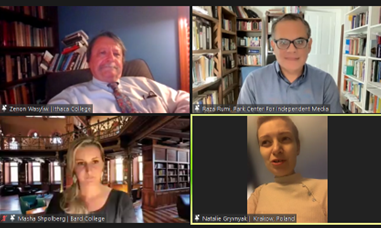On September 7, the Finger Lakes Environmental Film Festival (FLEFF) and the Park Center for Independent Media facilitated a conversation with scholars and media experts on coverage of the Russia-Ukraine war in independent and mainstream media. Speakers offered perspectives spanning on-the-ground reporting, Eastern European history, and film production. Their analyses raised vital questions on the impacts of media concerning the war. The discussion was led by PCIM Director Raza Rumi, who opened the session by welcoming the nearly 100 attendees who had tuned in from across the globe.
Ukrainian journalist Natalie Gryvnyak began by reviewing the situation on the ground in Ukraine and how the roles and expectations of Ukrainian journalists have changed. “Ukrainian journalists are learning how to become war reporters,” stated Gryvnyak. “A lot of Ukrainian journalists are collecting [documentation of] war crimes for investigations and reports.”
Gryvnyak outlined the severity of the toll the Russian invasion has taken on Ukrainian journalism. “Approximately 435 crimes were made against journalists in particular in the past 6 months, after the 24th of February. Out of them, 37 journalists were killed and approximately 215 media organizations closed because of the aggression.”
Masha Shpolberg, a film historian and professor at Bard College, examined the importance of documentary media during wartime. “If we think about ‘news’ as wanting to inform, I’m looking at audio visual media which seeks to document reality and seeks to preserve it for the future. And I think there’s actually something very hopeful there, because it imagines already a future after the war.”
Shpolberg shared the works of Babylon’13, a Ukrainian cinematographic community that created a platform for documentary cinematography capturing the events of Ukraine’s civil protest. She stressed the importance of visual documentation of the atrocities of war and its role in helping to ensure accountability for human rights violations and war crimes.
Professor Zenon Wasyliw of the Ithaca College History Department offered insights on the war from a cultural perspective. He warned of the potential erasure of Ukrainian history that is occurring as part of the Russian attacks.
“Part of the battle line now is history and academics. There was a real clue over a year ago, with Putin’s speech, where he recreated and imagined history that can be clearly described as neo-colonialism, neo-imperialism… We have to understand that the attacks [on Ukraine] also focus on universities cultural institutions, things of that nature. When troops came into Mariupol etc., word went out that people were trying to save libraries, trying to save documents.”
Concluding the conversation, professor Shpolberg acknowledged the failings of American and Western media in adequately capturing the realities of wars in foreign countries. She stressed that wars are not fought between two superpowers, but by people on the ground.
“We don’t get to hear about the efforts of everyday people, and we don’t recognize the fact that the people have a lot more agency than sometimes we want to give them.”

